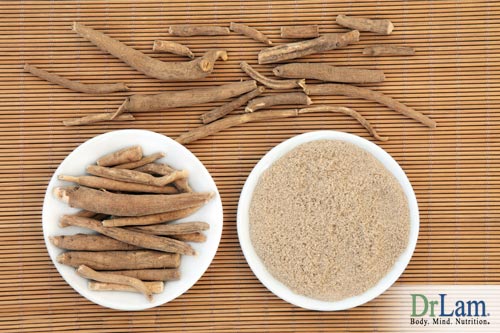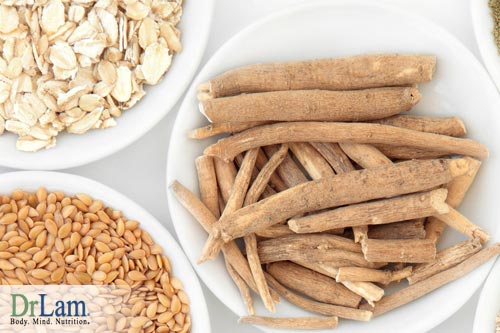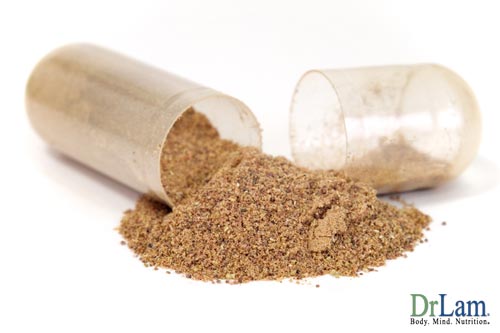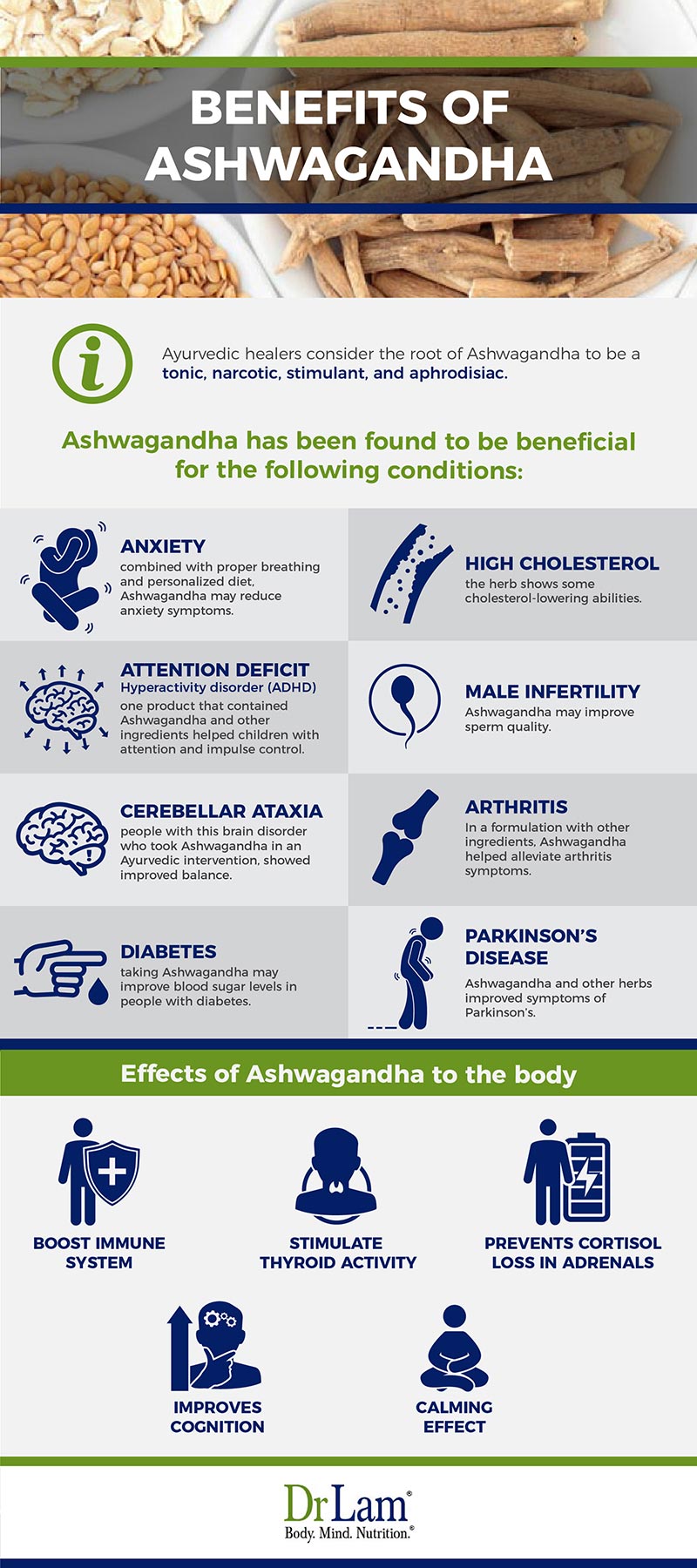 Ashwagandha, also known as Indian ginseng, is an herb that is known to boost the immune system, stimulate the thyroid, prevent cortisol loss and enhance cognition, among many other characteristics. Benefits of Ashwagandha include supporting healing and maintaining the body’s delicate balance. When under stress, a natural remedy such as an herbal supplement can help alleviate symptoms and restore your body to optimal functioning.
Ashwagandha, also known as Indian ginseng, is an herb that is known to boost the immune system, stimulate the thyroid, prevent cortisol loss and enhance cognition, among many other characteristics. Benefits of Ashwagandha include supporting healing and maintaining the body’s delicate balance. When under stress, a natural remedy such as an herbal supplement can help alleviate symptoms and restore your body to optimal functioning.
The available scientific data on Ashwagandha shows that the herb is a potent regenerative agent. It has multiple pharmacological actions, which include neuroprotective, analgesic and anti-inflammatory properties. Not just useful for treating the physical ailments common in clinical levels of stress, Ashwagandha is also useful for mood disorders and memory loss.
As a popular Ayurvedic herb in India, Ashwagandha is given to the young and old to heal scores of ailments, with some even using it as an aphrodisiac. While healers use it for various conditions, scientists are studying the herb to prove its efficacy.
It has been used widely as a supplement among those with adrenal fatigue. While it has its positive aspects, we have, unfortunately, seen negative results when it is not used properly, which is why sufferers of adrenal fatigue should know about this herb, including its uses and cautions.
The plant Ashwagandha (Withania somnifera L.) is a member of the nightshade family with a strong-smelling root. In Sanskrit, the name means "smells like a horse". The roots and berries from the plant are widely used in Ayurvedic, Indian, and African medicine.
Ayurvedic healers consider the root of Ashwagandha to be a tonic, narcotic, stimulant, and aphrodisiac. Preparations include a powder mixed in milk, and a paste made from the root crushed in water. The paste is applied to ulcers and other painful swellings as a narcotic. The leaves of the Ashwagandha plant are bitter and used to alleviate fevers or severe, painful swelling, due to their anti-inflammatory properties.
However, what Ashwagandha may be most famous for is its adaptogenic properties, helping the body to cope with stress. “Adaptogenic” indicates that the herb has qualities that boost functions when needed and calm functions when called for. This ability to adapt to the body’s internal environment has led to wide-spread, indiscriminate use of this herb for those who are fatigued and seek vitality. Some people use it for cognitive health, claiming that it helps them think better. Others use it to alleviate pain and swelling. Some even claim the herb has anti-aging properties.
 Ashwagandha has been found to be beneficial for the following conditions:
Ashwagandha has been found to be beneficial for the following conditions:
Ashwagandha is believed to work by calming the brain, reducing inflammation, lowering blood pressure, and boosting the immune system. It is widely touted as helping those with adrenal fatigue – a condition where the body’s neuroendocrine stress response is compromised due to overwhelming stress, resulting in a compensatory systemic slowdown to conserve energy. Fatigue and lethargy are classic symptoms, and in severe cases one can become incapacitated.
Ashwagandha is recognized as an herbal supplement for adaptogenically boosting adrenal function. The hypothalamic-pituitary-adrenal (HPA) axis drives the adrenal gland to secrete more anti-stress hormone and is part of the neuroendometabolic (NEM) stress response. The NEM stress response is made up of six component responses that serve to regulate and control stress in the body. When the body is chronically stressed, the six responses may become imbalanced and result in certain symptoms, including anxiety, depression, fatigue, insomnia, brain fog, low thyroid function, salt cravings, reduced libido, etc. Ashwagandha is purported to help balance these response systems by helping to regulate mood, balance hormones, and boost the immune system.
Read more about the NEM response system here.
 Ashwagandha apparently also has immunomodulatory and immunostimulatory abilities. One study in mice found significant modulation of immunity. In the study, investigators induced myelosuppression with one of three compounds: cyclophosphamide, azathioprine, or prednisolone. They measured activity using hematological and serological tests, and found that Ashwagandha prevented myelosuppression.
Ashwagandha apparently also has immunomodulatory and immunostimulatory abilities. One study in mice found significant modulation of immunity. In the study, investigators induced myelosuppression with one of three compounds: cyclophosphamide, azathioprine, or prednisolone. They measured activity using hematological and serological tests, and found that Ashwagandha prevented myelosuppression.
The herb increased hemoglobin concentration, red blood cell count, white blood cell count and platelet count, and the mice gained weight. The studies in mice also showed immunomodulatory and immunostimulatory properties that may help people navigate the NEM stress response.
People with adrenal fatigue syndrome in advanced stages often have mild to serious issues with inflammation and a limping immune system. A low-energy state in the body often forces it to slow down certain body systems. The immune system may be one of the unwitting targets, which may lead to more frequent bacterial or viral infections that also tend to last longer than normal. As shown in the clinical studies with the mice, Ashwagandha may be helpful to support the immune system.
The hormonal system responds to stress via the adrenal glands and the thyroid. If the thyroid has deficits in functioning, a person is likely to feel fatigued. Ashwagandha was found, in one study, to stimulate thyroid activity. In the study, researchers administered Ashwagandha root extract to the mice for 20 days. The findings showed increased thyroid function, as well as improved liver functioning.
One study looked at Ashwagandha as an agent to prevent the loss of cortisol in the adrenal glands. In the study, mice that swam in water for five hours experienced a significant loss of cortisol due to the exercise stress. They also lost ascorbic acid content. When researchers administered Ashwagandha, loss of cortisol and ascorbic acid was prevented.
 People suffering with adrenal fatigue have varying levels of cortisol, depending on the time of day and other factors. Taking Ashwagandha appears to prevent or reduce the loss of cortisol, helping the individual have more energy.
People suffering with adrenal fatigue have varying levels of cortisol, depending on the time of day and other factors. Taking Ashwagandha appears to prevent or reduce the loss of cortisol, helping the individual have more energy.
Of clinical note, however, the cortisol-maintaining capabilities of Ashwagandha are typically only seen in the earlier stages of adrenal fatigue. In this stage, the adrenals are able to respond to the herb and produce the requisite hormones to maintain balance in the body. In more advanced stages, people often find that Ashwagandha stimulates their system too much, leaving them feeling “wired”. The adapotgenic property is skewed in favor of being stimulatory for reasons not yet known. Therefore, you should use Ashwagandha should be used judiciously and only with an experienced practitioner. In fact, improper use of this herb can lead to adrenal crashes and retarded adrenal recovery.
With NEM stress response imbalance, people often feel anxious, depressed and moody. They could have insomnia and difficulty concentrating. This is a result of dysregulation in the neuroaffective response. The neuroaffective response is primarily regulated by neurotransmitters that are produced by the autonomic nervous system, central nervous system and gut. When the neurotransmitters are not equally balanced with each other, the symptoms mentioned above may result. This neuroaffective response is common in adrenal fatigue syndrome.
Ashwagandha has been shown in many studies to slow, stop, or reverse the loss of brain cells. The herb is recommended for people with Alzheimer's, Parkinson's, Huntington's, and other neurodegenerative diseases. With the power to alleviate these neurodegenerative diseases, people suffering from adrenal fatigue could try the herb to help with the brain fog and mood disorders common in the NEM response.
 Ashwagandha has a calming effect, similar to the drug Lorazepam. Researchers tested the herb in rats in three standard tests of anxiety: social interaction, the elevated plus-maze and feeding latency in an unfamiliar environment. The herb reduced brain levels of tribulin, a sign of clinical anxiety. Antidepressant effects were witnessed in stress tests and the herb acted as a mood stabilizer, staving off anxiety and depression. In advanced stages of adrenal fatigue however, Ashwagandha can often have the opposite effect, leaving the body feeling wired instead of calm.
Ashwagandha has a calming effect, similar to the drug Lorazepam. Researchers tested the herb in rats in three standard tests of anxiety: social interaction, the elevated plus-maze and feeding latency in an unfamiliar environment. The herb reduced brain levels of tribulin, a sign of clinical anxiety. Antidepressant effects were witnessed in stress tests and the herb acted as a mood stabilizer, staving off anxiety and depression. In advanced stages of adrenal fatigue however, Ashwagandha can often have the opposite effect, leaving the body feeling wired instead of calm.
Recovering from adrenal fatigue can take some time. Working with a specialist in the NEM response can help define priorities. A holistic plan will be personalized and flexible. Initial steps will include an examination of the stressors present in an individual’s lifestyle, as adrenal fatigue is generally caused by stress. Eliminating stimulants such as coffee and tea is advised. More and better-quality sleep can help reset hormonal balances and improve mood. Exercise is a key component in restoring equilibrium. Ashwagandha has biologically active components that can help restore balance and help people feel better. The herb should be used as a component in the adrenal fatigue recovery plan, instituted after consultation with a healthcare expert.
People in later stages of adrenal fatigue should be careful when taking certain herbs as the effect may be the opposite of intended, due to the compromised adrenal system and the herb’s stimulatory effects mentioned earlier. While Ashwagandha’s benefits are many, for some people, the herb may delay or prevent the healing process. The adaptogenic properties may be most beneficial for people in mild stages of adrenal fatigue. In others, the herb may trigger an adrenal crisis. Additionally, long-term use may lead to dependency as the individual uses Ashwagandha to increase energy, needing a higher and higher dose. People may feel fatigued and over-stimulated at the same time. Withdrawing from the herb may cause mental and physical distress. People with advanced adrenal fatigue should consult with an experienced clinician before adding Ashwagandha to their adrenal fatigue recovery plan.
 The healing benefits of Ashwagandha are available in capsule form. Dosages are typically 600 to 1,000mg twice daily, although factors such as the user’s age and health affect the required dosage. A much more effective delivery method is fermented Ashwagandha. The fermentation process breaks down the Ashwagandha into its basic components, thereby significantly increasing bioavailability and ease of absorption.
The healing benefits of Ashwagandha are available in capsule form. Dosages are typically 600 to 1,000mg twice daily, although factors such as the user’s age and health affect the required dosage. A much more effective delivery method is fermented Ashwagandha. The fermentation process breaks down the Ashwagandha into its basic components, thereby significantly increasing bioavailability and ease of absorption.
Potential side-effects of Ashwagandha may include vomiting, diarrhea, or stomach discomfort. The effects of applying the herb to the skin are not known. Pregnant women are advised to not use the herb.
Since the herb helps lower blood-sugar levels, people taking drugs or supplements for diabetes should monitor blood sugar closely. Since the herb improves thyroid activity, people taking thyroid medications should monitor their condition while taking Ashwagandha, or avoid the herb.
The herb can act as a sedative, so use caution when driving or operating machinery. Using Ashwagandha with other supplements or drugs may increase the sedative effect. The herb is not known to interact negatively with food.

Ashwagandha is a powerful her with regenerative, anti-inflammatory, analgesic, and neuroprotective properties. One of the most important benefits of Ashwagandha is the fact that it works both on the physical level improving the health of the adrenal glands and helping rebalance the hormones, and on the mental level helping to relieve anxiety. If you're thinking of trying this herb, here's what you need to know:
Ashwagandha can be very beneficial if you have adrenal fatigue. However, it can have negative effects if you're in the later stages of adrenal fatigue, so check with your doctor before taking it or talk to our friendly staff by clicking here or give us a call on on +1 (626) 571-1234.
© Copyright 2016-2020 Michael Lam, M.D. All Rights Reserved.
